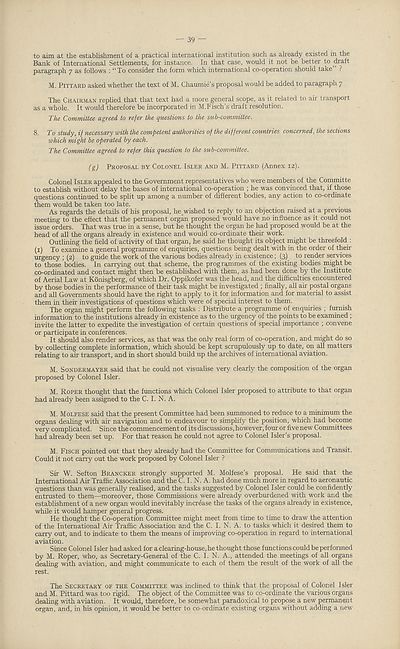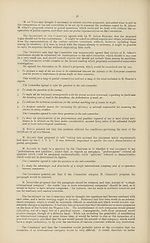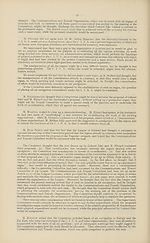Communications and transit > Air transport co-operation committee : minutes of the first session : held at Geneva from July 8th to 12th, 1930
(39)
Download files
Complete book:
Individual page:
Thumbnail gallery: Grid view | List view

— 39
to aim at the establishment of a practical international institution such as already existed in the
Bank of International Settlements, for instance. In that case, would it not be better to draft
paragraph 7 as follows : “To consider the form which international co-operation should take’ ?
M. Pittard asked whether the text of M. Chaumie’s proposal would be added to paragraph 7
The Chairman replied that that text had a more general scope, as it related to air transport
as a whole. It would therefore be incorporated in M.Fisch’s draft resolution.
The Committee agreed to refer the questions to the sub-committee.
8. To study, if necessary with the competent authorities of the different countries concerned, the sections
which might be operated by each.
The Committee agreed to refer this question to the sub-committee.
(g) Proposal by Colonel Isler and M. Pittard (Annex 12).
Colonel Isler appealed to the Government representatives who were members of the Committe
to establish without delay the bases of international co-operation ; he was convinced that, if those
questions continued to be split up among a number of different bodies, any action to co-ordinate
them would be taken too late.
As regards the details of his proposal, he wished to reply to an objection raised at a previous
meeting to the effect that the permanent organ proposed would have no influence as it could not
issue orders. That was true in a sense, but he thought the organ he had proposed would be at the
head of all the organs already in existence and would co-ordinate their work.
Outlining the field of activity of that organ, he said he thought its object might be threefold :
(1) To examine a general programme of enquiries, questions being dealt with in the order of their
urgency ; (2) to guide the work of the various bodies already in existence; (3) to render services
to those bodies. In carrying out that scheme, the programmes of the existing bodies might be
co-ordinated and contact might then be established with them, as had been done by the Institute
of Aerial Law at Konisgberg, of which Dr. Oppikofer was the head, and the difficulties encountered
by those bodies in the performance of their task might be investigated ; finally, all air postal organs
and all Governments should have the right to apply to it for information and for material to assist
them in their investigations of questions which were of special interest to them.
The organ might perform the following tasks : Distribute a programme of enquiries ; furnish
information to the institutions already in existence as to the urgency of the points to be examined ;
invite the latter to expedite the investigation of certain questions of special importance ; convene
or participate in conferences.
It should also render services, as that was the only real form of co-operation, and might do so
by collecting complete information, which should be kept scrupulously up to date, on all matters
relating to air transport, and in short should build up the archives of international aviation.
M. Sondermayer said that he could not visualise very clearly the composition of the organ
proposed by Colonel Isler.
M. Roper thought that the functions which Colonel Isler proposed to attribute to that organ
had already been assigned to the C. I. N. A.
M. Molfese said that the present Committee had been summoned to reduce to a minimum the
organs dealing with air navigation and to endeavour to simplify the position, which had become
very complicated. Since the commencement of its discussions, however, four or five new Committees
had already been set up. For that reason he could not agree to Colonel Isler’s proposal.
M. Fisch pointed out that they already had the Committee for Communications and Transit.
Could it not carry out the work proposed by Colonel Isler ?
Sir W. Sefton Brancker strongly supported M. Molfese’s proposal. He said that the
International Air Traffic Association and the C. I. N. A. had done much more in regard to aeronautic
questions than was generally realised, and the tasks suggested by Colonel Isler could be confidently
entrusted to them—moreover, those Commissions were already overburdened with work and the
establishment of a new organ would inevitably increase the tasks of the organs already in existence,
while it would hamper general progress.
He thought the Co-operation Committee might meet from time to time to draw the attention
of the International Air Traffic Association and the C. I. N. A. to tasks which it desired them to
carry out, and to indicate to them the means of improving co-operation in regard to international
aviation.
Since Colonel Isler had asked for a clearing-house, he thought those functions could be performed
by M. Roper, who, as Secretary-General of the C. I. N. A., attended the meetings of all organs
dealing with aviation, and might communicate to each of them the result of the work of all the
rest.
The Secretary of the Committee was inclined to think that the proposal of Colonel Isler
and M. Pittard was too rigid. The object of the Committee was to co-ordinate the various organs
dealing with aviation. It would, therefore, be somewhat paradoxical to propose a new permanent
organ, and, in his opinion, it would be better to co-ordinate existing organs without adding a new
to aim at the establishment of a practical international institution such as already existed in the
Bank of International Settlements, for instance. In that case, would it not be better to draft
paragraph 7 as follows : “To consider the form which international co-operation should take’ ?
M. Pittard asked whether the text of M. Chaumie’s proposal would be added to paragraph 7
The Chairman replied that that text had a more general scope, as it related to air transport
as a whole. It would therefore be incorporated in M.Fisch’s draft resolution.
The Committee agreed to refer the questions to the sub-committee.
8. To study, if necessary with the competent authorities of the different countries concerned, the sections
which might be operated by each.
The Committee agreed to refer this question to the sub-committee.
(g) Proposal by Colonel Isler and M. Pittard (Annex 12).
Colonel Isler appealed to the Government representatives who were members of the Committe
to establish without delay the bases of international co-operation ; he was convinced that, if those
questions continued to be split up among a number of different bodies, any action to co-ordinate
them would be taken too late.
As regards the details of his proposal, he wished to reply to an objection raised at a previous
meeting to the effect that the permanent organ proposed would have no influence as it could not
issue orders. That was true in a sense, but he thought the organ he had proposed would be at the
head of all the organs already in existence and would co-ordinate their work.
Outlining the field of activity of that organ, he said he thought its object might be threefold :
(1) To examine a general programme of enquiries, questions being dealt with in the order of their
urgency ; (2) to guide the work of the various bodies already in existence; (3) to render services
to those bodies. In carrying out that scheme, the programmes of the existing bodies might be
co-ordinated and contact might then be established with them, as had been done by the Institute
of Aerial Law at Konisgberg, of which Dr. Oppikofer was the head, and the difficulties encountered
by those bodies in the performance of their task might be investigated ; finally, all air postal organs
and all Governments should have the right to apply to it for information and for material to assist
them in their investigations of questions which were of special interest to them.
The organ might perform the following tasks : Distribute a programme of enquiries ; furnish
information to the institutions already in existence as to the urgency of the points to be examined ;
invite the latter to expedite the investigation of certain questions of special importance ; convene
or participate in conferences.
It should also render services, as that was the only real form of co-operation, and might do so
by collecting complete information, which should be kept scrupulously up to date, on all matters
relating to air transport, and in short should build up the archives of international aviation.
M. Sondermayer said that he could not visualise very clearly the composition of the organ
proposed by Colonel Isler.
M. Roper thought that the functions which Colonel Isler proposed to attribute to that organ
had already been assigned to the C. I. N. A.
M. Molfese said that the present Committee had been summoned to reduce to a minimum the
organs dealing with air navigation and to endeavour to simplify the position, which had become
very complicated. Since the commencement of its discussions, however, four or five new Committees
had already been set up. For that reason he could not agree to Colonel Isler’s proposal.
M. Fisch pointed out that they already had the Committee for Communications and Transit.
Could it not carry out the work proposed by Colonel Isler ?
Sir W. Sefton Brancker strongly supported M. Molfese’s proposal. He said that the
International Air Traffic Association and the C. I. N. A. had done much more in regard to aeronautic
questions than was generally realised, and the tasks suggested by Colonel Isler could be confidently
entrusted to them—moreover, those Commissions were already overburdened with work and the
establishment of a new organ would inevitably increase the tasks of the organs already in existence,
while it would hamper general progress.
He thought the Co-operation Committee might meet from time to time to draw the attention
of the International Air Traffic Association and the C. I. N. A. to tasks which it desired them to
carry out, and to indicate to them the means of improving co-operation in regard to international
aviation.
Since Colonel Isler had asked for a clearing-house, he thought those functions could be performed
by M. Roper, who, as Secretary-General of the C. I. N. A., attended the meetings of all organs
dealing with aviation, and might communicate to each of them the result of the work of all the
rest.
The Secretary of the Committee was inclined to think that the proposal of Colonel Isler
and M. Pittard was too rigid. The object of the Committee was to co-ordinate the various organs
dealing with aviation. It would, therefore, be somewhat paradoxical to propose a new permanent
organ, and, in his opinion, it would be better to co-ordinate existing organs without adding a new
Set display mode to:
![]() Universal Viewer |
Universal Viewer | ![]() Mirador |
Large image | Transcription
Mirador |
Large image | Transcription
Images and transcriptions on this page, including medium image downloads, may be used under the Creative Commons Attribution 4.0 International Licence unless otherwise stated. ![]()
| League of Nations > Communications and transit > Air transport co-operation committee : minutes of the first session : held at Geneva from July 8th to 12th, 1930 > (39) |
|---|
| Permanent URL | https://digital.nls.uk/194043854 |
|---|
| Shelfmark | LN.VIII |
|---|
| Description | Over 1,200 documents from the non-political organs of the League of Nations that dealt with health, disarmament, economic and financial matters for the duration of the League (1919-1945). Also online are statistical bulletins, essential facts, and an overview of the League by the first Secretary General, Sir Eric Drummond. These items are part of the Official Publications collection at the National Library of Scotland. |
|---|---|
| Additional NLS resources: |
|

